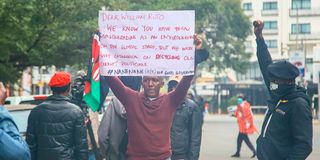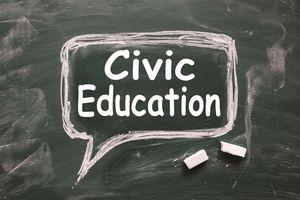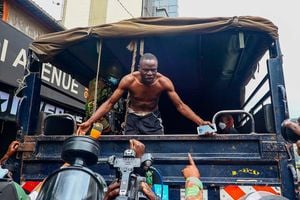
A protester displays a placard during demonstrations along Kimathi Street, Nairobi on August 8, 2024.
Gerry Loughran is sadly departed, but it is possible to still be deeply affected by the imagined lament of his sorrowful Sunday Nation despatch from London, whose streets are now astir with scenes of frightful violence ignited by the bilious fever of xenophobic savagery.
The Conservative Party's spectacular debacle in the last election appears to be the last straw, which has incited the desperation of a radicalised far right, addled as much by the venomous enchantments peddled in digital echo chambers of social media networks, and a paranoid rage against foreigners.
This is astutely cultivated by cynical political operatives, as well as actual economic difficulties experienced by nearly everyone in this crisis-steeped globe.
This seems to be an emerging cyclical dynamic of recent Western politics, where frustrated radical fringes resist the self-correcting imperative of democratic elections, yet lack the momentum to proceed in their preferred trajectory after the exposure of their often simplistic but highly appealing narratives.
The infamous January 6 insurrection at the US Capitol might be deemed to be the first full-blown demonstration of this effect, and the bloodshed on the streets of London is certainly of a piece with it.
Subvert colonial oppression
Footage circulating in the social media shows marauding gangs of snarling thugs chanting, ”We want our country back!” Obviously indifferent to history, these goons are totally oblivious of the dreadful irony of their miserable campaign: they are not resisting colonial invasion, nor agitating for sovereignty.
Yet the ferocity of their ghastly onslaught might be mistaken for a determined struggle to subvert colonial oppression, displacement and expropriation, forced labour and abominable robbery in the name of hut, poll and other taxes.
London is not new to infernal turmoil or bloodshed. Thomas Hobbes was prematurely born when the English civil war was in full cry, because the apocalyptic images of thunderous explosion, dark heavy billows of smoke and the heaving earth under thousands of martial feet “marching as to war” drove his mother into premature labour. The civil war itself is a marvel of thoroughgoing bloodshed on a vast, orgiastic scale. Strictly speaking, it was a concatenation of civil wars, catalysed by the complicated power manoeuvres of wildly ambitious people.
Along the way, the reign of Charles I came to an unscheduled end when, according to the celebrated Prof Phelomena Gunk, he found it difficult to perform his royal duties after his head was separated from the rest of his person. To be fair, Charles is by no means the first, or only, monarch to experience this insurmountable challenge to the due execution of his office — the point is that Hobbes' well-founded disenchantment with humanity in a state of natural liberty easily prevailed over the romantic visions espoused by other philosophers, chief of whom is Jean-Jacques Rousseau.
In any event, England and several other nations emerged afterwards and evolved into global powers by establishing and consolidating formidable statehoods following Hobbesian precepts, which delineate the nature and scope of sovereignty, liberty, the state and government. Limitations and exceptions are notable features of these frameworks: unlimited liberty (power of the citizen) is anarchy whilst untrammelled state power is oppressive. A properly configured state calibrates its sovereignty in terms of a delicate political equilibrium that must be vigilantly ministered to by all.
Platforms of political expression
The idea that a group of people that is not legitimately delegated through democratic election into constitutionally authorised offices can undertake actions in the name of the entire body of citizens, directly offends the fundamental principles underpinning our civil order. Moreover, protests and demonstrations, regardless of their righteous motivation and the rigour of their mobilisation, can only be restricted platforms of political expression on restricted agenda.
For instance, the Constitution permits tenants of one floor in a Thindigua bloc of flats, whose common areas are unlit and strewn with litter, to picket at the courtyard, march along the access lane, or take to Kiambu Road with placards aloft, whistles shrill and faces defiant, united in chanting, “Kang'ethe must go!”
Everyone else is free to get along with their ordinary business, join in solidarity, or counter-mobilise under a banner blazoned with loyal effusions along the lines of, “Kang'ethe juu, juu zaidi!” Depending on their issue, each group can present petitions at the local police station, county office or national ministerial agency.
On any given day, it is perfectly permissible and entirely in order for dozens of demonstrations, made up of one or even 10,000, to throng our avenues to amplify every imaginable variety of subject that seizes their imagination and passion. The unforgettable Release Political Prisoners pressure group memorably colonised Uhuru Park's Freedom Corner in Nairobi for over a decade, whilst one Ngonya wa Gakonya, of the Tent of the Living God, prosecuted his lone crusade for even longer.
It takes a vast, nationwide and structured process focused on a clearly defined question, meaningfully and involving every eligible citizen, to say that the people have spoken. Street action is wonderfully cathartic and admirably democratic, but it is a far cry from “We the People,” that nation-making, state-building civic moment.
The writer is an Advocate of the High Court of Kenya







